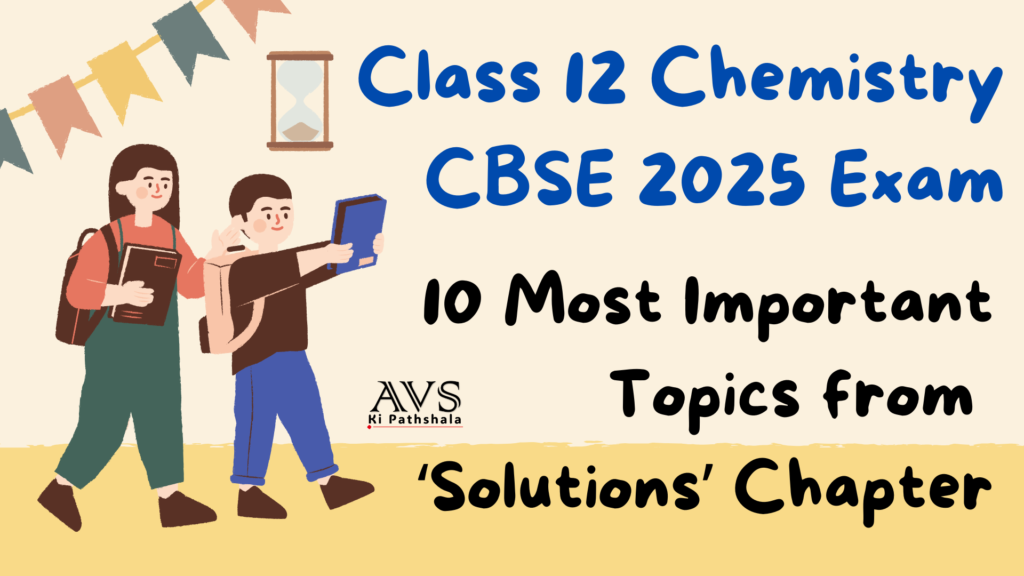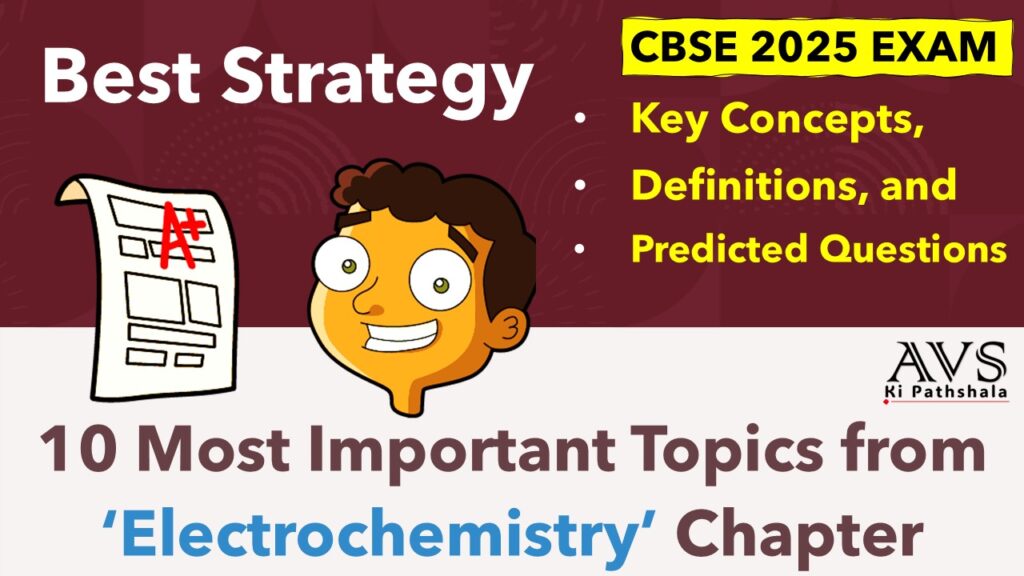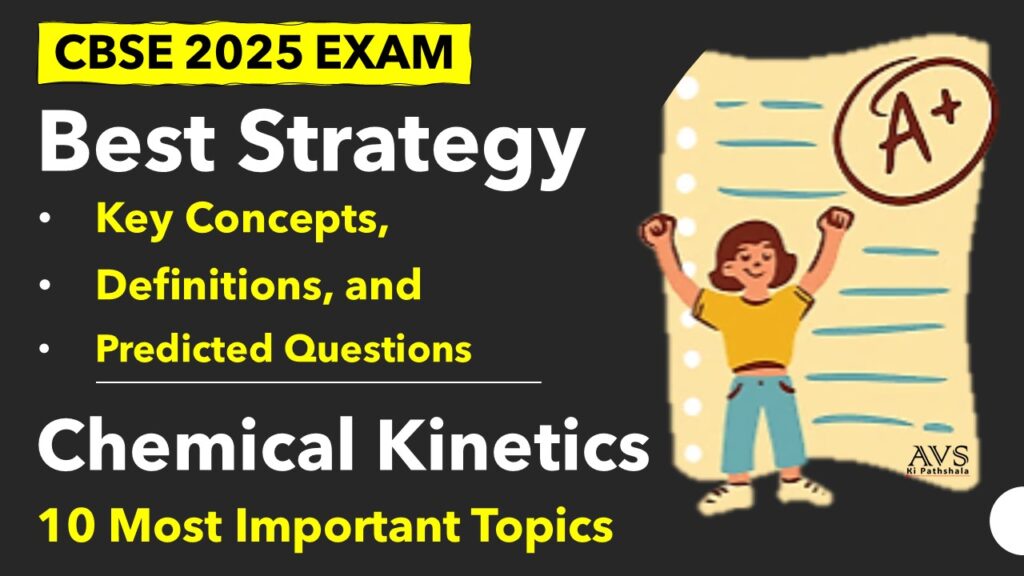Class 12 Chemistry: Solutions
Important Topics for Objective, Competency-Based, Case Study, and Assertion-Reason Type Questions
For Class 12 Chemistry exam, understanding different types of questions like objective, competency-based, case study, and assertion-reason helps in better preparation. The CBSE board exams now focus on assessing conceptual clarity through these question types. Below is the classification of important topics for each type:
1. Objective Type Questions (MCQs)
These questions assess basic concepts, definitions, and simple formula-based calculations. They are usually straightforward and can be answered in one step.
-
Raoult’s Law
- Likely Questions: Definition-based, formula-based, and conceptual understanding (e.g., deviations from Raoult’s Law).
-
Molarity, Molality, and Mole Fraction
- Likely Questions: Simple calculation of molarity, molality, and mole fraction; conversion questions (MCQs).
-
Colligative Properties
- Likely Questions: Basic definitions, formulae for boiling point elevation, and freezing point depression.
-
Henry’s Law
- Likely Questions: Simple conceptual questions about solubility of gases and pressure relations.
-
Elevation of Boiling Point
- Likely Questions: Direct formula-based MCQs.
-
Depression of Freezing Point
- Likely Questions: Direct MCQs on formula and basic definitions.
2. Competency-Based Questions
These questions require applying the concept to real-world problems, analyzing a given situation, and drawing conclusions.
-
Henry’s Law
- Likely Questions: Application-based questions involving real-life scenarios such as gas solubility in cold drinks or decompression sickness in divers.
-
Osmotic Pressure and Its Applications
- Likely Questions: Applications in biological processes or industrial applications like reverse osmosis for water purification.
-
Abnormal Molar Mass and Van’t Hoff Factor
- Likely Questions: Practical scenarios where association or dissociation affects the molar mass, particularly in biological and industrial solutions.
-
Solubility and Factors Affecting Solubility
- Likely Questions: Practical applications like the effect of temperature on dissolving substances, or pressure affecting gas solubility in liquids.
3. Case Study-Based Questions
Case study questions assess the student’s ability to analyze and apply multiple concepts within a scenario. A case or problem is presented, followed by several questions.
-
Ideal and Non-Ideal Solutions
- Likely Questions: Case studies based on how real solutions deviate from ideal behavior (e.g., mixtures of ethanol and water).
-
Raoult’s Law
- Likely Questions: Case studies involving real-world solutions and how they follow or deviate from Raoult’s Law.
-
Colligative Properties
- Likely Questions: Case-based problems related to the use of colligative properties in real life, like anti-freeze in car engines or cooking at high altitudes (boiling point changes).
4. Assertion-Reason Type Questions
These questions test critical thinking by giving a statement (assertion) and an explanation (reason). Students have to determine if both are true and if the reason correctly explains the assertion.
-
Raoult’s Law
- Likely Questions: Assertion-Reason questions comparing volatile and non-volatile solutes.
-
Ideal and Non-Ideal Solutions
- Likely Questions: Assertion on whether a solution is ideal, with reasoning based on molecular interactions.
-
Colligative Properties
- Likely Questions: Assertion about a property, with reasoning based on the nature of solute particles (e.g., “Elevation in boiling point depends on the number of solute particles”).
-
Van’t Hoff Factor
- Likely Questions: Assertion about dissociation/association with reasoning based on the Van’t Hoff factor and abnormal molar masses.
-
Osmotic Pressure
- Likely Questions: Assertions about osmotic pressure and its relation to temperature, concentration, and molecular mass.
Conclusion
In preparation for CBSE Class 12 Chemistry board exams, it is important to focus on each type of question. Objective questions will test your basic knowledge, competency-based questions will check your problem-solving skills, case study questions will require you to apply concepts, and assertion-reason questions will assess your understanding of cause-effect relationships. Preparing thoroughly for these topics will ensure strong performance across all question formats.
To enhance your preparation even further for CBSE 2025 Exam, you can also connect with us on YouTube, where we will guide you through all these topics in a comprehensive manner. To join us on YouTube, simply click the link below, and you’ve already taken your first step towards scoring better marks.
In the next post, we will discuss the key topics of the chapter ‘Electrochemistry.’
Thank you!
Note: All the topics covered in this article are based on the “Solutions” chapter of Class 12 CBSE Board Chemistry and have been curated after analyzing previous years question papers. This article can be helpful for students aiming for success in exams, but it’s also important to thoroughly understand the entire syllabus and practice regularly. Best wishes to all students!





